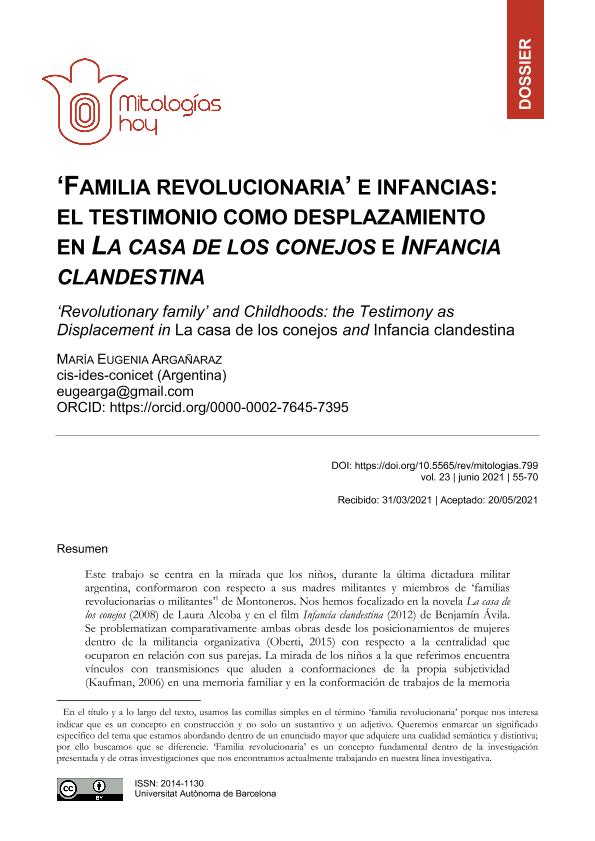Artículo
Este trabajo se centra en la mirada que los niños, durante la última dictadura militar argentina, conformaron con respecto a sus madres militantes y miembros de ‘familias revolucionarias o militantes’ de Montoneros. Nos hemos focalizado en la novela La casa de los conejos (2008) de Laura Alcoba y en el film Infancia clandestina (2012) de Benjamín Ávila. Se problematizan comparativamente ambas obras desde los posicionamientos de mujeres dentro de la militancia organizativa (Oberti, 2015) con respecto a la centralidad que ocuparon en relación con sus parejas. La mirada de los niños a la que referimos encuentra vínculos con transmisiones que aluden a conformaciones de la propia subjetividad (Kaufman, 2006) en una memoria familiar y en la conformación de trabajos de la memoria (Jelin, 2002) que las voces narrativas de esos hijos/as llevan adelante con el objetivo de dar testimonio. Finalmente, el trabajo de Teresa Basile (2019, 2020) es significativo para dar cuenta acerca de los tipos de infancias que estos niños desarrollan, para dar lugar a lo que se identifica como Segunda Generación de HIJOS. Con el fin de referir a las miradas de los niños, se han tenido en cuenta las formas narrativas en que las obras expresan la crianza en medio de los modos de maternar en contextos de violencia extrema. Ambas piezas aluden a prácticas culturales y testimoniales. Además, en la novela y en el film aparecen infancias con carácter fronterizo, en el sentido de que los niños crecen y dan testimonio de esa dimensión política que recuerdan y construyen a medida que el relato avanza. Todo ello dentro de núcleos familiares militantes que habilitan y habilitaron la figura del infante no solo como testigo sino también como partícipe de la historia argentina. This work focuses on the view that children, during the last Argentine military dictatorship, formed with respect to their militant mothers, members of ´revolutionary or militant families´ of Montoneros. In this opportunity, our analysis will focus on the novel La casa de los conejos (2008), by Laura Alcoba, and the film Infancia clandestina (2012), by Benjamín Ávila. Our analysis will problematize comparatively both works, exploring the relations between the positions that these women occupy in the organized militancy (Oberti, 2015) and those that they occupy in their couple life. The children's gaze to which we refer finds links with transmissions that allude to conformations of subjectivity itself (Kaufman, 2006) in a family memory and in the conformation of memory works (Jelin, 2002) that the narrative voices that these children carry on with the objective of giving testimony. Finally, the work of Teresa Basile (2019, 2020) will help us to account the types of childhoods that these children develop, leading to what is identified as the Second Generation of CHILDREN. In order to refer to the children’s gaze, we have taken into account the narrative forms in which the works represent the upbringing and mothering in contexts of extreme violence. Both works refer to cultural and testimonial practices. In the novel and in the film, childhoods appear with a border character, in the sense that children grow up and bear witness to that political dimension that they remember and build as the story progresses. All this within militant family nuclei that enable and empower the figure of the infant not only as a witness but as a participant in Argentine history.
Familia revolucionaria e infancias: El testimonio como desplazamiento en la casa de los conejos e infancia clandestina
Título:
Revolutionary family’ and childhoods: The testimony as displacement in la casa de los conejos and infancia clandestina
Fecha de publicación:
06/2021
Editorial:
Universitat Autònoma de Barcelona
Revista:
Mitologias Hoy
ISSN:
2014-1130
Idioma:
Español
Tipo de recurso:
Artículo publicado
Clasificación temática:
Resumen
Palabras clave:
HIJOS
,
FAMILIA
,
MATERNIDAD
,
MILITANCIA
,
RESISTENCIA
Archivos asociados
Licencia
Identificadores
Colecciones
Articulos(CIS)
Articulos de CTRO.DE INVESTIGACIONES SOCIALES
Articulos de CTRO.DE INVESTIGACIONES SOCIALES
Citación
Argañaraz, María Eugenia; Familia revolucionaria e infancias: El testimonio como desplazamiento en la casa de los conejos e infancia clandestina; Universitat Autònoma de Barcelona; Mitologias Hoy; 23; 6-2021; 55-70
Compartir
Altmétricas




